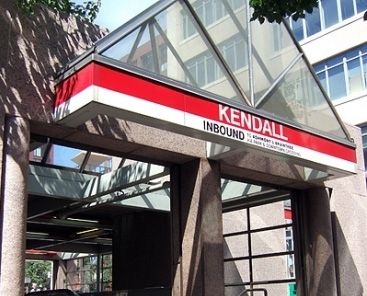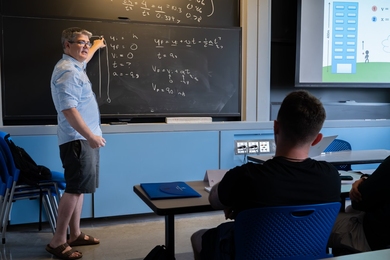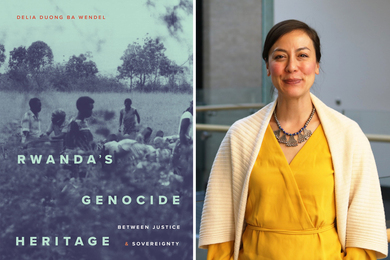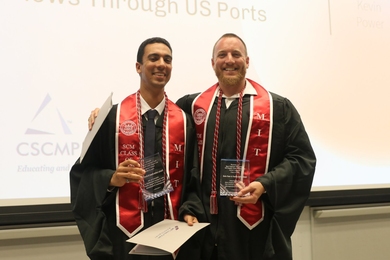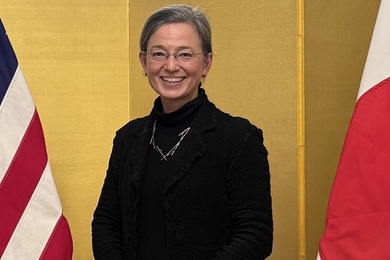MIT’s East Campus Steering Committee has selected a multidisciplinary urban design team to help advance plans for the redevelopment of Institute-owned property in East Campus and Kendall Square. The team will build upon the work of Elkus Manfredi Architects, which led to the adoption of new zoning regulations in the district, as well as the work of a faculty design group led by the School of Architecture and Planning (SA+P), which recently developed design typologies for the Institute’s property in the Kendall Square area.
Urban design team
The East Campus urban design team will be led by Mack Scogin Merrill Elam Architects of Atlanta, in cooperation with Michael Van Valkenburgh Landscape Architects of Cambridge and New York. Ken Greenberg, a renowned urban planner from Toronto, will provide urban design guidance. The team also includes Vanasse Hangen Brustlin for transportation analysis, Atelier Ten for environmental design planning, and HR+A Advisors for strategic advisory services.
SA+P Dean Adèle Santos, who chaired the faculty design group, said, “I believe that we have chosen the very best firms and individuals for this next phase of the process. The skills and experience of the overall team will allow us to move forward with thoughtful creativity and practical know-how.”
Goals of the study
The intent of the study is to create a long-range development framework to accommodate future academic, commercial, and residential uses on MIT property in Kendall Square, as well as a gateway to the East Campus area. Goals for the study include:
“A critical component of the work ahead will be to collect valuable input from the MIT and Cambridge communities,” said Executive Vice President and Treasurer Israel Ruiz, who was actively engaged in MIT’s three-year Kendall Square rezoning process, and has remained involved in the exploration of Kendall Square and East Campus design concepts. “I’m delighted that an undergraduate student and a graduate student are serving on the steering committee that is guiding the East Campus/Kendall gateway study.”
Three MIT community forums are planned to gather feedback on the process, goals, planning principles, and early concepts of the urban design effort. In a similar fashion, three Cambridge community forums will also be held. The meetings will each provide the most up-to-date information at the time:
MIT community forums
Thursday, Nov. 7, 5:30 to 7 p.m. (Room 3-270)
Wednesday, Dec. 11, 5:30 to 7 p.m. (Room 32-155)
Tuesday, Jan. 21, 5:30 to 7 p.m. (Location TBD)
Cambridge community forums
Thursday, Nov. 14, 5:30 to 7 p.m. (Room 4-153)
Thursday, Dec. 12, 5:30 to 7 p.m. (Room 56-154)
Wednesday, Jan. 22, 5:30 to 7 p.m. (Location TBD)
Associate Provost Martin Schmidt, who also participated in the Kendall Square rezoning effort and is actively involved with the East Campus study process, said, “The work to reimagine the East Campus/Kendall Square area of MIT will benefit from the collective wisdom of the broader community. I encourage members of the MIT and Cambridge communities to attend these sessions. Our shared creative thinking can converge to propel forward one of the most important innovation hubs in the world, and help to create a vibrant and welcoming gathering place for visitors to Cambridge, as well as the residents, students, and employees of the greater Kendall Square environs.”
Information available throughout the design study
In addition to the community forums, the MIT 2030 website will provide current information and resources throughout the urban design process.
Members of the MIT and Cambridge communities are invited to share ideas, questions, and comments by visiting the website, or by sending an email to mit2030ideas@mit.edu.
Urban design team
The East Campus urban design team will be led by Mack Scogin Merrill Elam Architects of Atlanta, in cooperation with Michael Van Valkenburgh Landscape Architects of Cambridge and New York. Ken Greenberg, a renowned urban planner from Toronto, will provide urban design guidance. The team also includes Vanasse Hangen Brustlin for transportation analysis, Atelier Ten for environmental design planning, and HR+A Advisors for strategic advisory services.
SA+P Dean Adèle Santos, who chaired the faculty design group, said, “I believe that we have chosen the very best firms and individuals for this next phase of the process. The skills and experience of the overall team will allow us to move forward with thoughtful creativity and practical know-how.”
Goals of the study
The intent of the study is to create a long-range development framework to accommodate future academic, commercial, and residential uses on MIT property in Kendall Square, as well as a gateway to the East Campus area. Goals for the study include:
- enhancing the existing Kendall Square innovation cluster by providing space for new innovative academic initiatives and commercial enterprises;
- creating a lively urban environment by developing a destination gathering and arrival place with amenities and services and active streetscapes for all;
- establishing a vibrant new gateway and connective links between MIT, the central business district, and the Cambridge community; and
- creating an overall development plan that is feasible.
“A critical component of the work ahead will be to collect valuable input from the MIT and Cambridge communities,” said Executive Vice President and Treasurer Israel Ruiz, who was actively engaged in MIT’s three-year Kendall Square rezoning process, and has remained involved in the exploration of Kendall Square and East Campus design concepts. “I’m delighted that an undergraduate student and a graduate student are serving on the steering committee that is guiding the East Campus/Kendall gateway study.”
Three MIT community forums are planned to gather feedback on the process, goals, planning principles, and early concepts of the urban design effort. In a similar fashion, three Cambridge community forums will also be held. The meetings will each provide the most up-to-date information at the time:
MIT community forums
Thursday, Nov. 7, 5:30 to 7 p.m. (Room 3-270)
Wednesday, Dec. 11, 5:30 to 7 p.m. (Room 32-155)
Tuesday, Jan. 21, 5:30 to 7 p.m. (Location TBD)
Cambridge community forums
Thursday, Nov. 14, 5:30 to 7 p.m. (Room 4-153)
Thursday, Dec. 12, 5:30 to 7 p.m. (Room 56-154)
Wednesday, Jan. 22, 5:30 to 7 p.m. (Location TBD)
Associate Provost Martin Schmidt, who also participated in the Kendall Square rezoning effort and is actively involved with the East Campus study process, said, “The work to reimagine the East Campus/Kendall Square area of MIT will benefit from the collective wisdom of the broader community. I encourage members of the MIT and Cambridge communities to attend these sessions. Our shared creative thinking can converge to propel forward one of the most important innovation hubs in the world, and help to create a vibrant and welcoming gathering place for visitors to Cambridge, as well as the residents, students, and employees of the greater Kendall Square environs.”
Information available throughout the design study
In addition to the community forums, the MIT 2030 website will provide current information and resources throughout the urban design process.
Members of the MIT and Cambridge communities are invited to share ideas, questions, and comments by visiting the website, or by sending an email to mit2030ideas@mit.edu.
